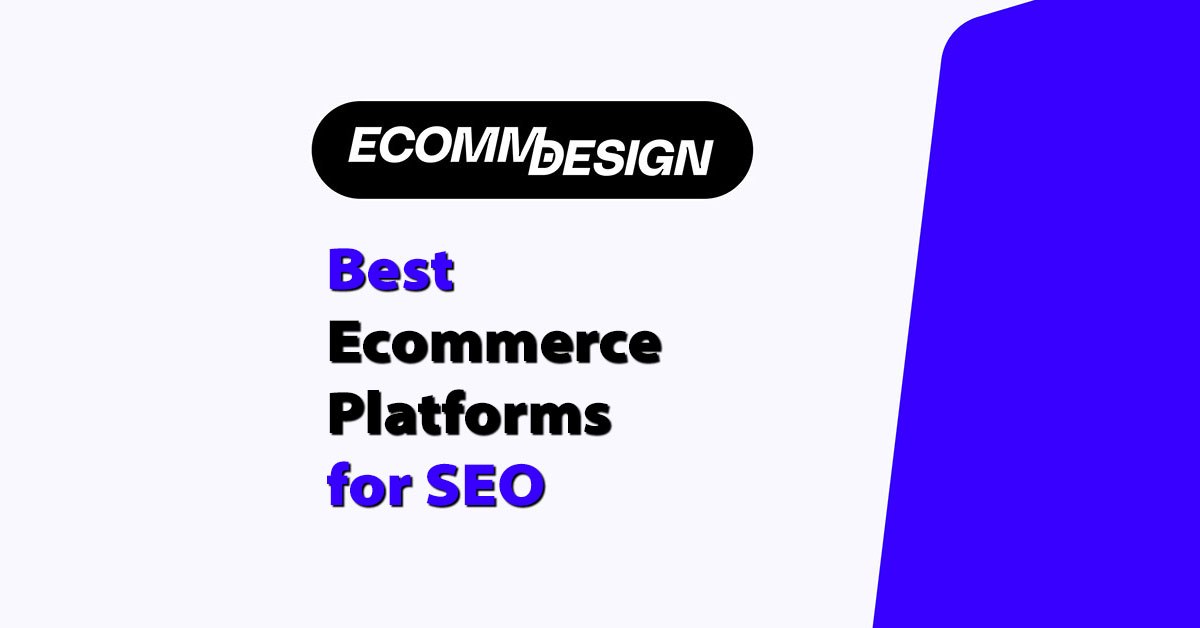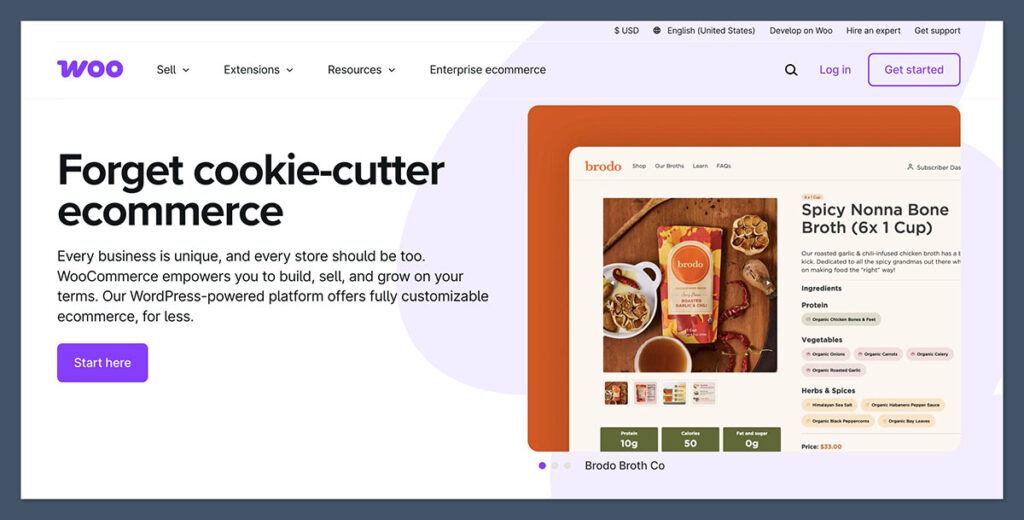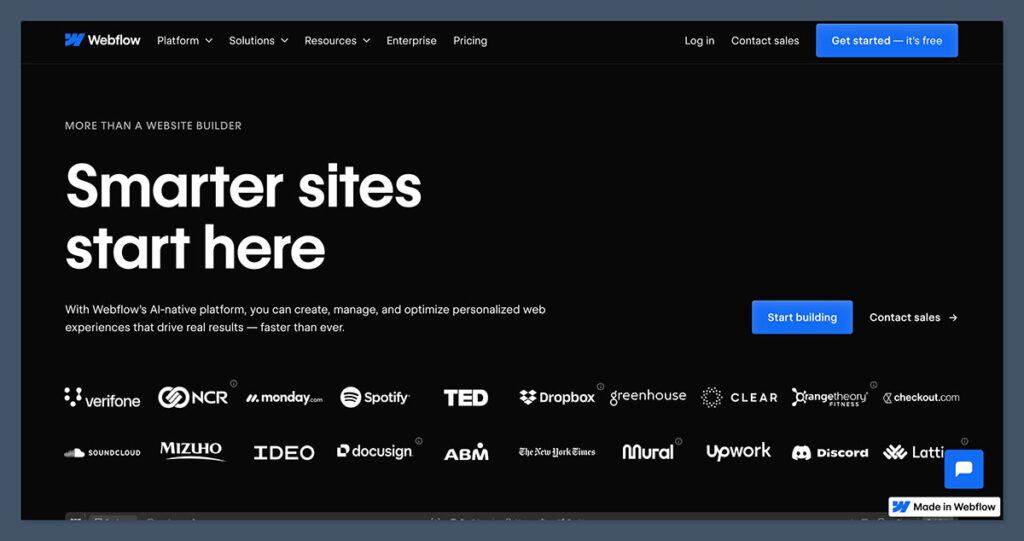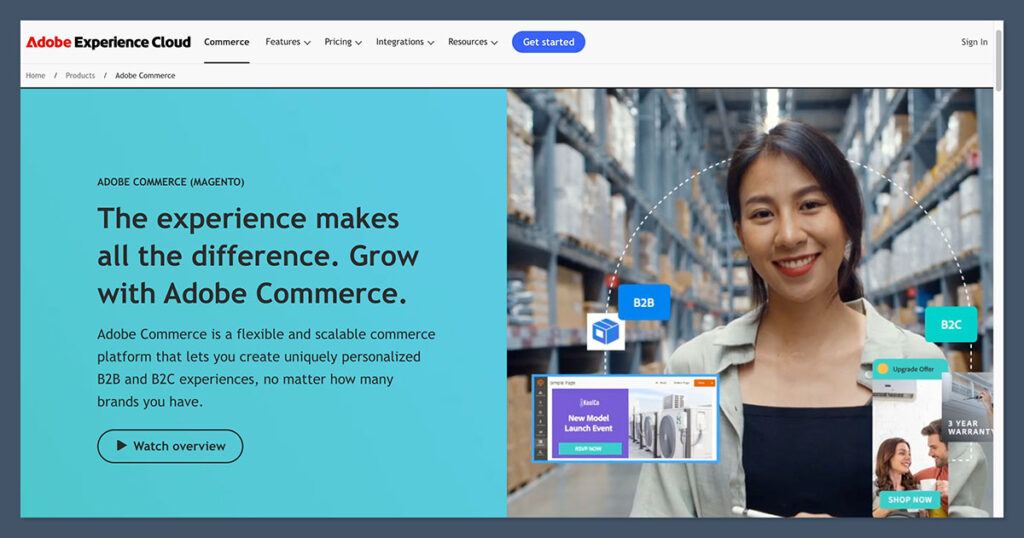
We’ve tested and analyzed the top ecommerce platforms to find out which ones are best for SEO.
Whether you’re launching a brand-new store or switching from another platform, SEO should be top of mind — it’s still one of the most cost-effective ways to drive traffic.
From blogging tools to page speed to structured data, we reviewed dozens of features that impact how your store performs in Google.
Below are our top five platforms for SEO in 2025.
Quick Comparison: Top Ecommerce Platforms for SEO
| Platform | Best For | Starting Price | SEO Score |
|---|---|---|---|
| Shopify | Scaling stores & quick setup | $29/mo | ★★★★★ |
| WooCommerce | Content-heavy stores & SEO control | Free + Hosting | ★★★★☆ |
| BigCommerce | Built-in SEO features | $39/mo | ★★★★☆ |
| Webflow | Speed + design + SEO flexibility | $42/mo | ★★★★☆ |
| Adobe Commerce | Enterprise-level SEO | Free + Dev Costs | ★★★★☆ |
#1. Shopify – Best for Quick Setup + SEO Scalability

Starting Price: $29/month
Free Trial: 3 days + $1/month for 3 months
Blog Functionality: Basic
Structured Data: Via apps (Schema Plus, Smart SEO)
Ease of Use: High
Shopify is one of the most widely used ecommerce platforms and makes it very easy to launch a store fast. It has excellent performance, solid SEO app integrations, and scalable infrastructure.
While it lacks deep SEO flexibility, you can still achieve good rankings with the right plugins and settings.
That said, Shopify’s URL structure is limited — you’re locked into folders like /products/ and /collections/. It’s not a deal-breaker, but advanced SEOs may find it frustrating.
Still, Shopify is unmatched in terms of usability, community support, and store management. If you’re balancing SEO with paid ads or influencer marketing, Shopify gives you just enough control while simplifying the rest of your workflow.
Pricing
| Plan | Cost (Billed Monthly) |
|---|---|
| Basic | $29/month |
| Shopify | $79/month |
| Advanced | $299/month |
| Shopify Plus | From $2,000/month |
| Popular SEO Apps | $10–$30/month (optional) |
| Trial Offer | 3 days + $1/month x 3 |
Key SEO Features
- Built-in SSL and fast hosting
- Easy integration with Google Search Console
- SEO apps for automation and schema
- Basic blogging tool included
Best For: New ecommerce stores and fast-growing brands
#2. WooCommerce – Best for Full SEO Control

Starting Price: Free (hosting starts around $25/month)
Free Plan Available: Yes
Blog Functionality: Best-in-class
Structured Data: Via plugins like Yoast or RankMath
Ease of Use: Medium
WooCommerce is built on WordPress, which means it inherits the most powerful blogging and content marketing engine available today. That alone makes it a top pick if you’re growing through organic search.
You get full control over every SEO element — from meta tags to schema markup. You can also create custom landing pages, optimize product URLs, and structure your site architecture however you like.
If you’re publishing long-form content, managing a blog, or running a content-first ecommerce brand, WooCommerce is hands-down the best option.
It gives you the tools and flexibility to dominate on-page SEO without limitations, provided you’re comfortable managing plugins and performance.
Pricing
| Item | Cost |
|---|---|
| WooCommerce Plugin | Free |
| Hosting | $25–$100/month |
| Premium Theme | $30–$100 (one-time) |
| SEO Plugin (Yoast/RM Pro) | $59–$129/year |
| Total Monthly Estimate | $35–$150/month |
Key SEO Features
- Customizable permalinks and URL structures
- SEO plugin compatibility (RankMath, Yoast, AIOSEO)
- Optimized for long-form content and blogging
- Integrates easily with performance plugins like WP Rocket
Best For: SEO-focused ecommerce brands who rely on content
#3. BigCommerce – Best Built-In SEO Tools

Starting Price: $39/month
Free Plan Available: No
Blog Functionality: Moderate
Structured Data: Built-in for products
Ease of Use: Medium
BigCommerce gives you advanced SEO features out of the box. You won’t need to rely on a bunch of third-party apps to add basic SEO capabilities.
It’s clean, fast, and handles schema, redirects, and page speed without much effort.
Unlike Shopify, BigCommerce gives you full control over URL structure, which is crucial for clean indexing and user-friendly product pages.
Another huge advantage is that BigCommerce handles technical SEO at scale without requiring advanced development work. That makes it an ideal choice for business owners who want solid rankings without having to dive deep into backend customizations.
Pricing
| Plan | Cost (Billed Monthly) |
|---|---|
| Standard | $39/month |
| Plus | $105/month |
| Pro | $399/month |
| Enterprise | Custom pricing |
| Free Trial | 15 days |
| Transaction Fees | None |
Key SEO Features
- Custom URLs with no forced folders
- AMP support
- Built-in 301 redirect management
- Auto-generated product schema
Best For: Mid-size to enterprise ecommerce businesses scaling via SEO
#4. Webflow Ecommerce – Best for Speed and Customization

Starting Price: $42/month
Free Plan Available: Yes (limited)
Blog Functionality: Advanced CMS
Structured Data: Manual or via embeds
Ease of Use: Medium
Webflow is a designer-friendly website builder that delivers clean code, custom design, and full control over your SEO settings.
Its ecommerce features aren’t as advanced as Shopify’s or BigCommerce’s, but for niche or DTC brands focused on speed and aesthetics, it’s a strong contender.
You’ll need to be a bit more technical, but Webflow’s visual builder makes the process easier than coding from scratch. Plus, with total control over URLs, metadata, and page structure, Webflow gives you everything you need to optimize your store.
Where Webflow shines is performance — it’s one of the few builders that nails both design and Core Web Vitals. For brands looking to make a strong first impression and rank well technically, Webflow stands out in ways most platforms can’t match.
Pricing
| Plan | Cost (Billed Monthly) |
|---|---|
| Standard Ecommerce | $42/month |
| Plus Ecommerce | $84/month |
| Advanced Ecommerce | $235/month |
| CMS (non-ecommerce) Plan | From $29/month |
| Free Trial | Limited free plan |
Key SEO Features
- Full control over page titles, URLs, and meta descriptions
- Built-in CMS for blogs and content hubs
- Great Core Web Vitals performance
- Clean semantic HTML
Best For: DTC and creative ecommerce brands that prioritize speed and design
#5. Adobe Commerce – Best for Enterprise SEO

Starting Price: Free (self-hosted)
Enterprise Pricing: From $22,000/year
Blog Functionality: Requires module
Structured Data: Full control
Ease of Use: Low
Adobe Commerce (formerly Magento) is a heavyweight platform built for large-scale ecommerce operations. It’s not for beginners — you’ll need a dev team or agency to manage setup and customizations — but it delivers unmatched control over SEO at scale.
Adobe Commerce is ideal for massive product catalogs, multi-store environments, and global SEO. You can configure every technical detail, from canonical tags to hreflang for international SEO.
One major advantage of Adobe Commerce is its flexibility for enterprise requirements — if you’re managing hundreds of categories, thousands of SKUs, or multilingual storefronts, this platform is one of the few that can handle it all without compromise.
Pricing
| Item | Cost Estimate |
|---|---|
| Magento Open Source | Free |
| Adobe Commerce (Cloud) | From $22,000/year |
| Hosting (Cloud/VPS) | $50–$300+/month |
| Developer Support | $500–$5,000+/month |
| Maintenance + Modules | Varies by need |
Key SEO Features
- Full access to modify robots.txt, sitemap, and metadata
- Complete schema markup customization
- Advanced redirect logic
- Scalable performance infrastructure
Best For: Large ecommerce businesses with complex SEO needs
SEO Feature Comparison Table
While no platform checks every box perfectly, this table helps you identify what matters most to your business:
| Feature | WooCommerce | BigCommerce | Shopify | Webflow | Magento |
|---|---|---|---|---|---|
| Custom URL Structures | Yes | Yes | Limited | Yes | Yes |
| Schema Markup | Plugin | Built-In | App | Manual | Full |
| Blog Capability | Advanced | Moderate | Basic | Advanced | Requires Extension |
| Mobile Optimization | Theme-based | Built-In | Built-In | Built-In | Custom |
| Page Speed Optimization | Depends | Excellent | Good | Excellent | Custom |
| Ease of Use | Medium | Medium | High | Medium | Low |
If you’re prioritizing content, blogging, and total flexibility, WooCommerce stands out. For built-in structure and scalability without much technical fuss, BigCommerce is a top choice. And if ease of use is non-negotiable, Shopify leads the pack — just expect to use a few apps to cover SEO gaps.
Final Thoughts: Which Platform Should You Use?
Here’s what I’d recommend based on your priorities:
- Content-first store? Go with WooCommerce
- Need SEO done-for-you out of the box? Try BigCommerce
- Want fast setup with room to grow? Start with Shopify
- Building a high-performance niche brand? Choose Webflow
- Running an enterprise-level store? Invest in Magento
If SEO is a big part of your traffic strategy (and it should be), choosing the right ecommerce platform can make or break your success.
You want something that’s fast, flexible, and built to scale — without costing you more time or money trying to hack it together later.



